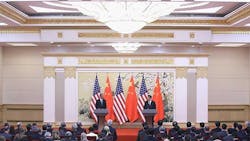US, China Reach Historic Climate Deal -- but Will it Work?
NAYPYIDAW -- A surprise deal between the United States and China on Wednesday could be a breakthrough moment in decades-long efforts to secure a global climate change pact, environment experts said.
However major questions remain over whether the world's two biggest polluters can achieve their new targets on curbing greenhouse gas emissions, while analysts say they will eventually need to do much more.
At a summit in Beijing, President Barack Obama and his Chinese counterpart, Xi Jinping, announced their two nations had put aside years of acrimony on climate change and would co-operate in the global warming fight.
Al Gore, the former U.S. vice-president who won the Nobel Peace Prize in 2007 for sounding the alarm on climate change, was among environmental heavy-hitters from around the world who celebrated the move.
"Today's joint announcement... to reduce their nations' carbon emissions is a major step forward in the global effort to solve the climate crisis," Gore said.
"Much more will be required -- including a global agreement from all nations -- but these actions demonstrate a serious commitment by the top two global polluters."
One key part of the deal saw China commit for the first time to limiting its greenhouse gas output -- by setting a target of around 2030 for its emissions to peak.
It also pledged that 20% of its energy would come from renewable sources by 2030, a colossal undertaking equivalent to powering the United States national grid purely through non-fossil fuels.
Obama said the United States would cut its own emissions of greenhouse gases by 26%-28% from 2005 levels by 2025.
The announcement was widely interpreted as vital in securing a global pact at a United Nations summit in Paris next year to limit global warming to two degrees Celsius (3.6 degrees Fahrenheit).
That level is seen as the maximum before a tipping point for catastrophic droughts, floods, species extinction and other disasters is reached.
The United Nations' process has floundered since efforts to achieve a similar pact at a 2009 summit in Copenhagen crumbled.
Long-standing feuding between the United States and China -- who are jointly responsible for 45% of the world's greenhouse gas emissions -- were a key reason for the Copenhagen failure, and subsequent stalemates.
The United States had long maintained that it would not sign up to any global pact, including the 1997 Kyoto Protocol, unless China and other developing nations committed to cutting their emissions.
But China insisted that it should not be held to scaling back its emissions because it was a poorer country and needed fossil fuels to help drive prosperity.
It said the United States and other rich nations were more responsible because they had done the bulk of the polluting since the start of industrialization.
Inspire Others
But with China and the United States now largely putting aside those divisions and working together, expectations are high that momentum in the UN process will quickly build.
"This joint announcement provides both practical and political momentum towards a new, universal climate agreement in Paris in late 2015 that is meaningful," UN climate chief Christiana Figueres said.
As part of the UN process, all nations are expected to submit their plans for cutting greenhouse gas emissions in the first quarter of 2015, for ratification at the Paris summit.
The targets announced on Wednesday are expected to form the centerpieces of the U.S. and Chinese submissions, which global environment campaigners Greenpeace said would inspire other nations.
"I think it's a very positive signal that will have a positive impact on the climate progress in Paris," Greenpeace East Asia senior climate and energy campaigner Li Shuo said.
Li also emphasised the magnitude of China's commitments, as it required 800-1000 gigawatts of clean energy to be installed by 2030.
"It is equivalent to building a U.S. energy network in the next 15 years, entirely based on non-fossil fuel," he said.
Li and other environment experts said this was still not enough, nor were the commitments from China.
"We don't think this is the best they can do... today's announcements should only be the floor and not the ceiling of enhanced actions," Li said.
And there are concerns the United States will not be able to fulfil its part of the deal. Obama has only two years left of his presidency, and Republicans are already howling in opposition to his plans.
-Karl Malakunas, AFP
Copyright Agence France-Presse, 2014
About the Author
Agence France-Presse
Copyright Agence France-Presse, 2002-2025. AFP text, photos, graphics and logos shall not be reproduced, published, broadcast, rewritten for broadcast or publication or redistributed directly or indirectly in any medium. AFP shall not be held liable for any delays, inaccuracies, errors or omissions in any AFP content, or for any actions taken in consequence.
